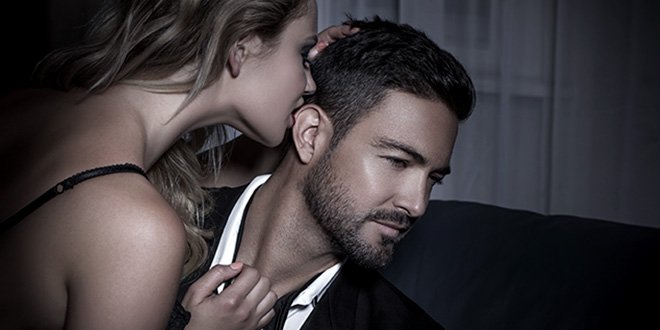With only a handful of laudable exceptions, issues of consent tend to get woefully shortchanged when it comes to sex on the silver screen. Think presumably telepathic characters, seamlessly falling into each other’s beds and arms, with nary a whisper of ‘Hey, do you want to…’ between them.
Depending on what levels of responsibility you think movies should be taking―particularly with regard to their target audiences―that’s bad enough. But it turns out you don’t have to look too far for glaring instances of not just skipping consent, but out and out harassment, assault, and rape.
Spanning genders and genres, here are Hollywood’s most reprehensible…
1. 40 Days and 40 Nights
Consent is about respecting and protecting the mental and physical well-being of both parties in a hookup or relationship situation. And yet, when it comes to hetero twosomes, much of the messaging and education out there is pitched solely at guys.
Yes, we do understand why that is―but enthusiastic consent applies to everyone, regardless of gender. That’s what makes rom com (yep, this is meant to be funny folks) ’40 Days and 40 Nights’ so very, very wrong. The premise is this: Matt pledges to abstain from sex (and masturbation) for Lent as a way to get over his ex. When said former flame gets wind of the bets being placed by Matt’s friends and colleagues as to whether he’ll maintain his celibacy, she rapes him while he’s asleep.
Takeaway: Sex with anyone without consent is rape. Guy-wise, an erection does not mean consent.
2. Grease
“Danny, get off me!”
We can be pretty selective when it comes to calling out consent issues of yesteryear. From flimsy excuses (“Oh, but things were just different then”), to the outright romanticization of harassment and assault, we routinely let older movies off the hook.
But when one such film inexplicably becomes the go-to choice for high school productions, it warrants a more critical approach. It’s not just that throwaway “Did she put up a fight” line, it’s the normalization of harassment throughout the movie.
There’s Putzie hiding in the bleachers to look up girls’ skirts, then there’s the male student exposing Patty’s underwear in the televised dance off. But it’s Danny groping Sandy despite her saying NO on their date that takes the biscuit. That, Danny Zuko, is why you’re alone at the drive-in.
Takeaway: No one deserves to be harassed, no matter what may or may not have happened on that summer night.
3. 50 Shades of Grey
Oh my, where to begin? ‘50 Shades of Grey’ is all kinds of problematic, but there’s one glaring misconception it trumpets to singularly irresponsible ends: BDSM relationships.
Whether it’s occasional role-play or a lifestyle, the Dom/sub bond is built on trust that goes way deeper than simply having a safe word; it’s about respect, and ensuring the mental and physical well-being of both partners. It’s not bullying and fear, it’s not undermining or cajoling, and it’s definitely not stalking.
BDSM is deeply rooted in consent, every single step of the way. Responsible practitioners discuss their fantasies and fetishes; they establish their physical and psychological limitations; they tend to partners’ bodily or emotional needs with empathy. All of which, frankly, should make remembering to ask for enthusiastic consent seem pretty easy. It also casts Christian’s treatment of Ana in a distinctly troubling light that feels more like abuse of power than it does love and respect.
Takeaway: BDSM is about more than a safe word and a sexed-up contract; it’s a continuous conversation between consenting (read: informed) partners.
4. Superbad
“You know when you hear girls say ‘Ah man, I was so sh*t-faced last night, I shouldn’t have f***ed that guy?’ We could be that mistake!”
When it comes to social lubricants, alcohol rates pretty high. Nothing wrong with that. But using booze as a segue to sex presents some serious pitfalls consent-wise. That’s precisely the crux of this 2007 comedy: will our hapless heroes succeed in getting Jules and Shirley sufficiently trashed to actually have sex with them? Will the teenaged charmers realize their dream and become a mistake?
Well, spoiler alert: no. But hinging the plot of an entire comedy on what sounds a lot like premeditated rape is, well, just not funny.
Had the movie ended with a clear indictment of this type of thinking, maybe it could have avoided being on this list, but that clearly someone thought that might have gotten in the way of comedy.
Takeaway: Having sex with someone you know to be too far gone to be in control of their judgement is rape. Oh, and being drunk doesn’t make unsolicited advances in any way funny.
5. Passengers
“He stole my life… It amounts to murder!”
A two-hour long metaphor for rape culture if ever there was one, on paper Passengers has the potential to be a meaty―if uneasy―lens for considering consent.
But it drops the ball in the most distasteful of ways: by romanticizing what’s essentially a predatory tale of stalking, Stockholm Syndrome and deceit.
It’s a serious letdown, particularly as Jim’s ethical conundrum is so genuinely compelling: having woken 90 years too early from a suspended animation pod, he finds himself all alone on a luxe spaceship somewhere between Earth and new planet, Homestead II.
With only an android barman for company, he does what any desperate space migrant might consider: he wakes a fellow passenger from hibernation. But despite the presence of scientists, engineers, doctors – basically any number of maybe would-be collaborators who might have the technical know-how to save the day, he picks a writer named Aurora.
Why? Because he’s fallen in love with her, wants an amorous relationship with her, and feels that he’s entitled to that. As if waking Aurora, thereby depriving her of her own agency wasn’t bad enough, he then successfully tricks her into embarking on a romance with him. Ugh.
Takeaway: Manipulating someone into having sex with you is never ever OK. Same rules apply in outer space.
[related_article id=”17191″ size=”full” target=”_blank”]
